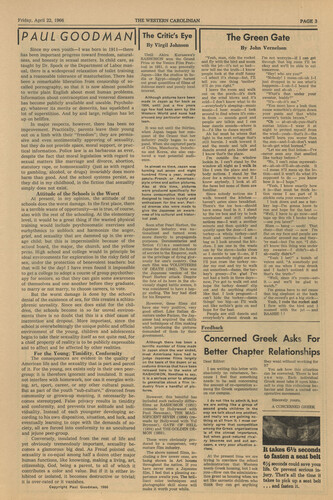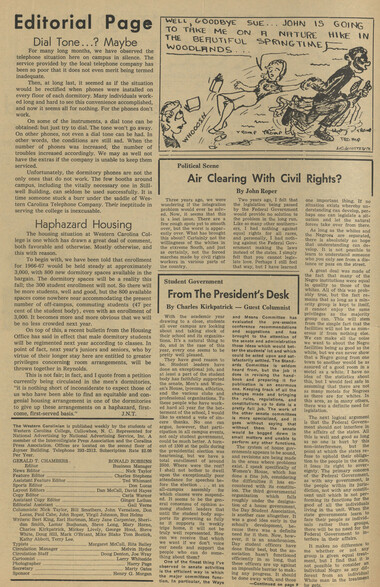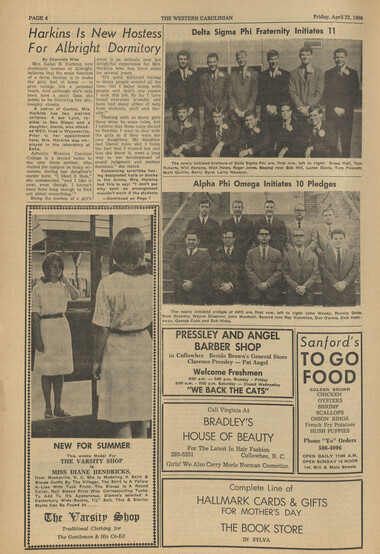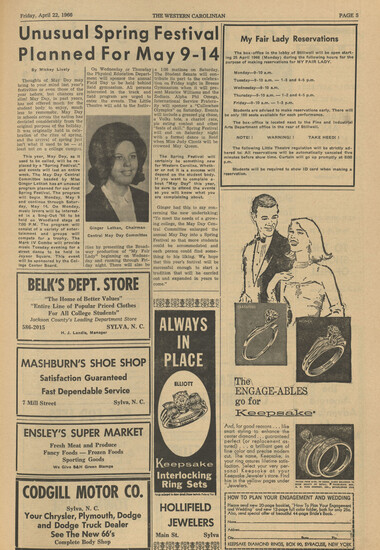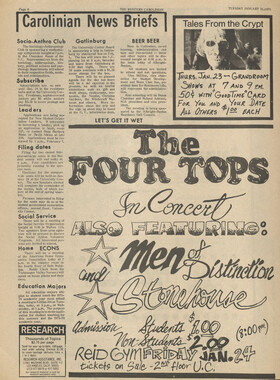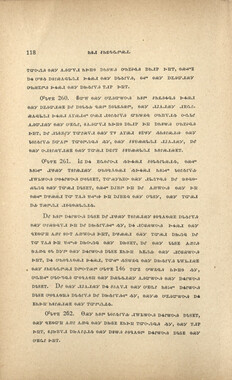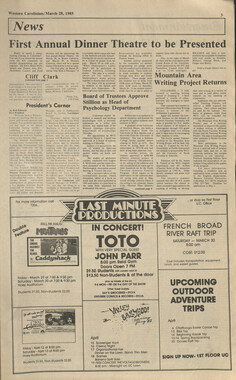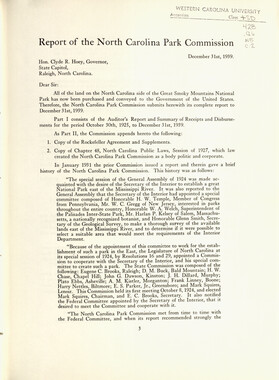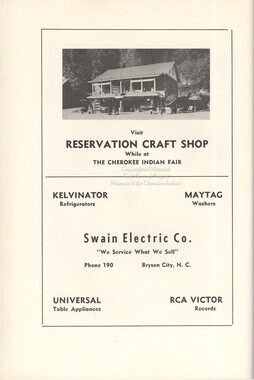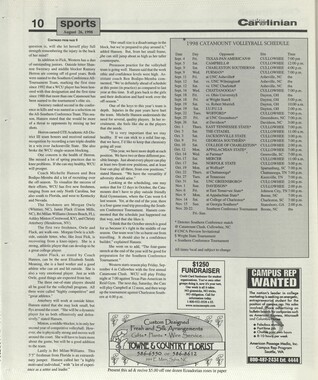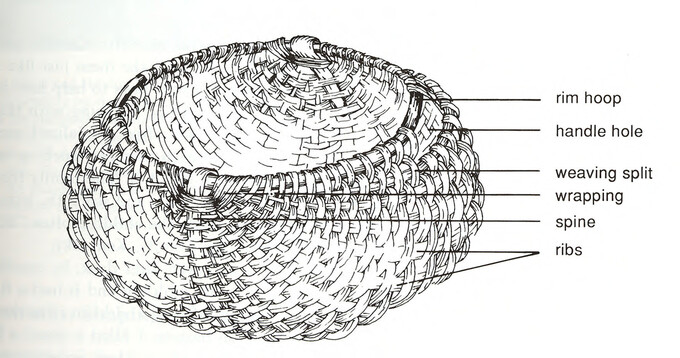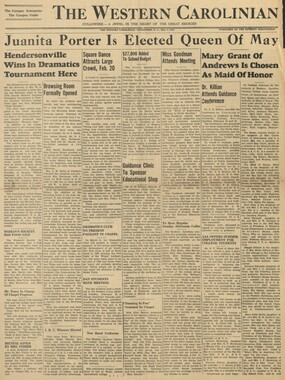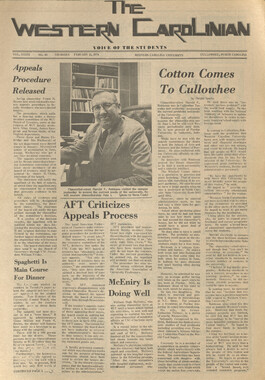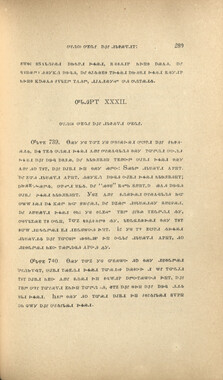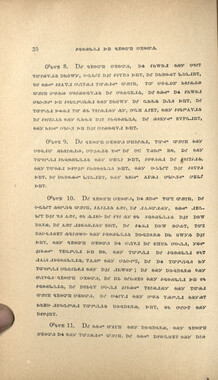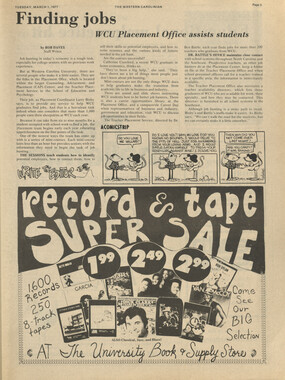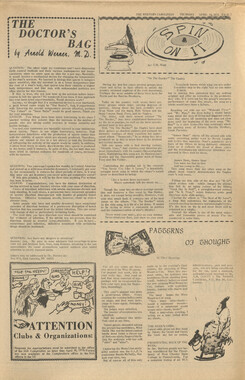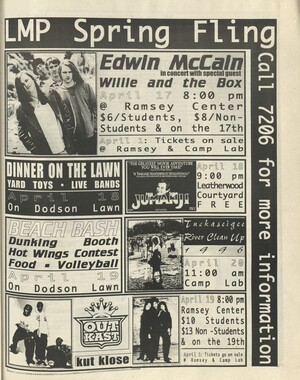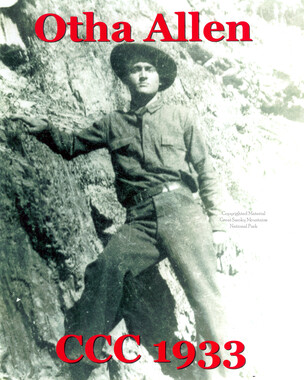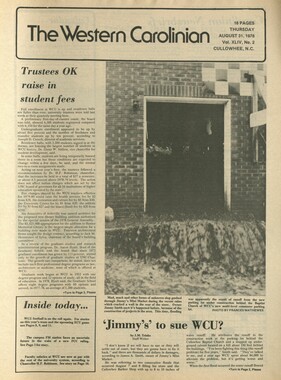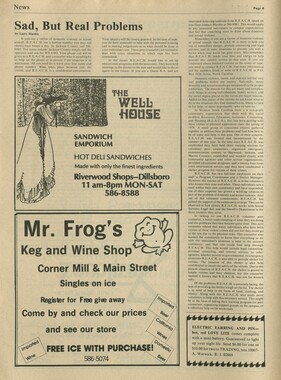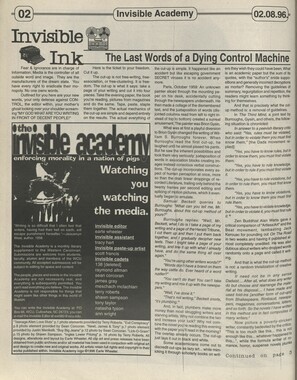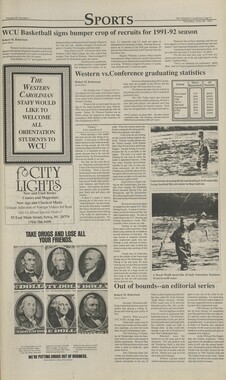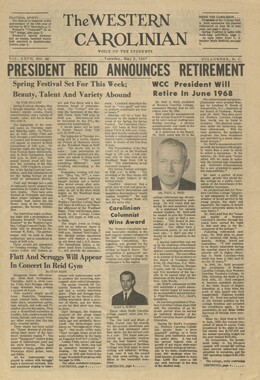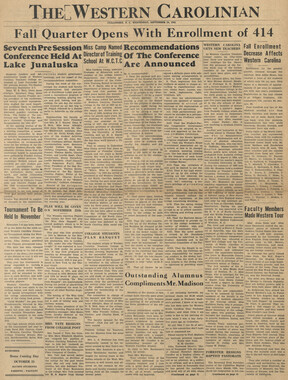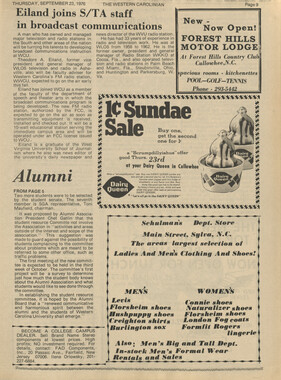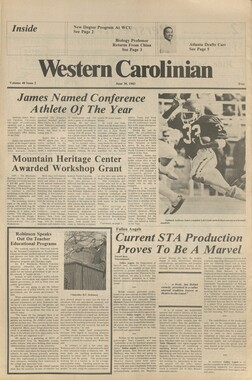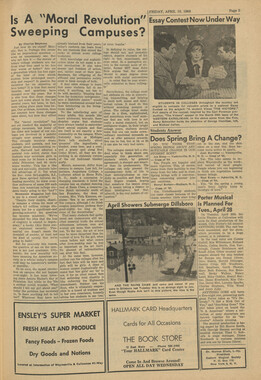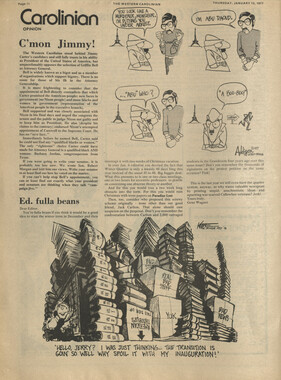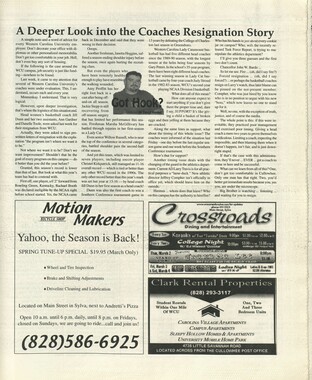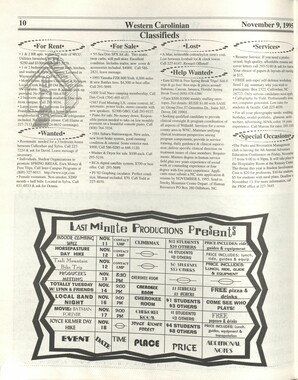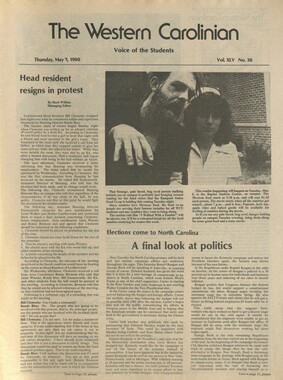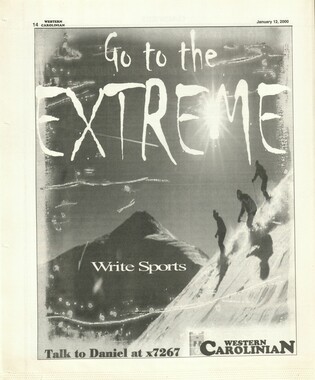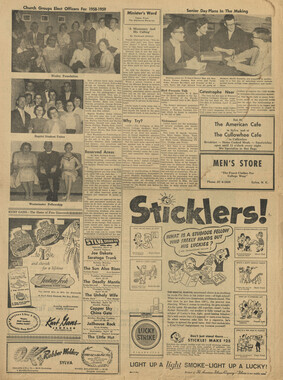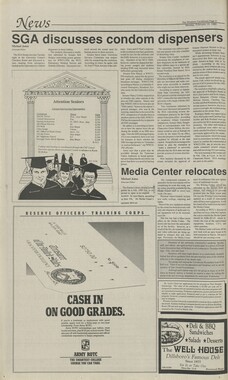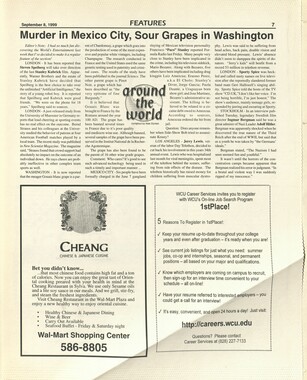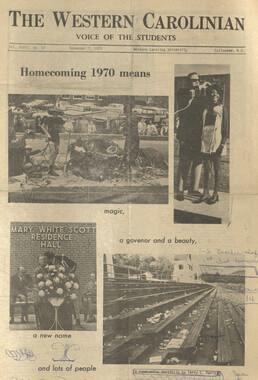Western Carolina University (20)
View all
- Canton Champion Fibre Company (2308)
- Cherokee Traditions (293)
- Civil War in Southern Appalachia (165)
- Craft Revival (1942)
- Great Smoky Mountains - A Park for America (2767)
- Highlights from Western Carolina University (430)
- Horace Kephart (941)
- Journeys Through Jackson (154)
- LGBTQIA+ Archive of Jackson County (24)
- Oral Histories of Western North Carolina (314)
- Picturing Appalachia (6772)
- Stories of Mountain Folk (413)
- Travel Western North Carolina (160)
- Western Carolina University Fine Art Museum Vitreograph Collection (129)
- Western Carolina University Herbarium (92)
- Western Carolina University: Making Memories (708)
- Western Carolina University Publications (2283)
- Western Carolina University Restricted Electronic Theses and Dissertations (146)
- Western North Carolina Regional Maps (71)
- World War II in Southern Appalachia (131)
University of North Carolina Asheville (6)
View all
- Allanstand Cottage Industries (62)
- Appalachian National Park Association (53)
- Bennett, Kelly, 1890-1974 (1388)
- Berry, Walter (76)
- Brasstown Carvers (40)
- Carver, George Washington, 1864?-1943 (26)
- Cathey, Joseph, 1803-1874 (1)
- Champion Fibre Company (233)
- Champion Paper and Fibre Company (297)
- Cherokee Indian Fair Association (16)
- Cherokee Language Program (22)
- Crowe, Amanda (40)
- Edmonston, Thomas Benton, 1842-1907 (7)
- Ensley, A. L. (Abraham Lincoln), 1865-1948 (275)
- Fromer, Irving Rhodes, 1913-1994 (70)
- George Butz (BFS 1907) (46)
- Goodrich, Frances Louisa (120)
- Grant, George Alexander, 1891-1964 (96)
- Heard, Marian Gladys (60)
- Kephart, Calvin, 1883-1969 (15)
- Kephart, Horace, 1862-1931 (313)
- Kephart, Laura, 1862-1954 (39)
- Laney, Gideon Thomas, 1889-1976 (439)
- Masa, George, 1881-1933 (61)
- McElhinney, William Julian, 1896-1953 (44)
- Niggli, Josephina, 1910-1983 (10)
- North Carolina Park Commission (105)
- Osborne, Kezia Stradley (9)
- Owens, Samuel Robert, 1918-1995 (11)
- Penland Weavers and Potters (36)
- Roberts, Vivienne (15)
- Roth, Albert, 1890-1974 (142)
- Schenck, Carl Alwin, 1868-1955 (1)
- Sherrill's Photography Studio (2565)
- Southern Highland Handicraft Guild (127)
- Southern Highlanders, Inc. (71)
- Stalcup, Jesse Bryson (46)
- Stearns, I. K. (213)
- Thompson, James Edward, 1880-1976 (226)
- United States. Indian Arts and Crafts Board (130)
- USFS (683)
- Vance, Zebulon Baird, 1830-1894 (1)
- Weaver, Zebulon, 1872-1948 (58)
- Western Carolina College (230)
- Western Carolina Teachers College (282)
- Western Carolina University (1794)
- Western Carolina University. Mountain Heritage Center (18)
- Whitman, Walt, 1819-1892 (10)
- Wilburn, Hiram Coleman, 1880-1967 (73)
- Williams, Isadora (3)
- Cain, Doreyl Ammons (0)
- Crittenden, Lorraine (0)
- Rhodes, Judy (0)
- Smith, Edward Clark (0)
- Appalachian Region, Southern (2393)
- Asheville (N.C.) (1887)
- Avery County (N.C.) (26)
- Blount County (Tenn.) (161)
- Buncombe County (N.C.) (1664)
- Cherokee County (N.C.) (283)
- Clay County (N.C.) (555)
- Graham County (N.C.) (233)
- Great Smoky Mountains National Park (N.C. and Tenn.) (478)
- Haywood County (N.C.) (3522)
- Henderson County (N.C.) (70)
- Jackson County (N.C.) (4692)
- Knox County (Tenn.) (25)
- Knoxville (Tenn.) (12)
- Lake Santeetlah (N.C.) (10)
- Macon County (N.C.) (420)
- Madison County (N.C.) (211)
- McDowell County (N.C.) (39)
- Mitchell County (N.C.) (132)
- Polk County (N.C.) (35)
- Qualla Boundary (981)
- Rutherford County (N.C.) (76)
- Swain County (N.C.) (2113)
- Transylvania County (N.C.) (247)
- Watauga County (N.C.) (12)
- Waynesville (N.C.) (68)
- Yancey County (N.C.) (72)
- Aerial Photographs (3)
- Aerial Views (60)
- Albums (books) (4)
- Articles (1)
- Artifacts (object Genre) (228)
- Biography (general Genre) (2)
- Cards (information Artifacts) (38)
- Clippings (information Artifacts) (191)
- Crafts (art Genres) (622)
- Depictions (visual Works) (21)
- Design Drawings (1)
- Drawings (visual Works) (184)
- Envelopes (73)
- Facsimiles (reproductions) (1)
- Fiction (general Genre) (4)
- Financial Records (12)
- Fliers (printed Matter) (67)
- Glass Plate Negatives (381)
- Guidebooks (2)
- Internegatives (10)
- Interviews (811)
- Land Surveys (102)
- Letters (correspondence) (1013)
- Manuscripts (documents) (619)
- Maps (documents) (159)
- Memorandums (25)
- Minutes (administrative Records) (59)
- Negatives (photographs) (5835)
- Newsletters (1285)
- Newspapers (2)
- Occupation Currency (1)
- Paintings (visual Works) (1)
- Pen And Ink Drawings (1)
- Periodicals (193)
- Personal Narratives (7)
- Photographs (12975)
- Plans (maps) (1)
- Poetry (6)
- Portraits (1663)
- Postcards (329)
- Programs (documents) (151)
- Publications (documents) (2237)
- Questionnaires (65)
- Scrapbooks (282)
- Sheet Music (1)
- Slides (photographs) (402)
- Sound Recordings (796)
- Specimens (92)
- Speeches (documents) (15)
- Tintypes (photographs) (8)
- Transcripts (322)
- Video Recordings (physical Artifacts) (23)
- Vitreographs (129)
- Text Messages (0)
- A.L. Ensley Collection (275)
- Appalachian Industrial School Records (7)
- Appalachian National Park Association Records (336)
- Axley-Meroney Collection (2)
- Bayard Wootten Photograph Collection (20)
- Bethel Rural Community Organization Collection (7)
- Blumer Collection (5)
- C.W. Slagle Collection (20)
- Canton Area Historical Museum (2110)
- Carlos C. Campbell Collection (282)
- Cataloochee History Project (65)
- Cherokee Studies Collection (4)
- Daisy Dame Photograph Album (5)
- Daniel Boone VI Collection (1)
- Doris Ulmann Photograph Collection (112)
- Elizabeth H. Lasley Collection (1)
- Elizabeth Woolworth Szold Fleharty Collection (4)
- Frank Fry Collection (95)
- George Masa Collection (173)
- Gideon Laney Collection (452)
- Hazel Scarborough Collection (2)
- Hiram C. Wilburn Papers (28)
- Historic Photographs Collection (236)
- Horace Kephart Collection (861)
- Humbard Collection (33)
- Hunter and Weaver Families Collection (1)
- I. D. Blumenthal Collection (4)
- Isadora Williams Collection (4)
- Jesse Bryson Stalcup Collection (47)
- Jim Thompson Collection (224)
- John B. Battle Collection (7)
- John C. Campbell Folk School Records (80)
- John Parris Collection (6)
- Judaculla Rock project (2)
- Kelly Bennett Collection (1407)
- Love Family Papers (11)
- Major Wiley Parris Civil War Letters (3)
- Map Collection (12)
- McFee-Misemer Civil War Letters (34)
- Mountain Heritage Center Collection (4)
- Norburn - Robertson - Thomson Families Collection (44)
- Pauline Hood Collection (7)
- Pre-Guild Collection (2)
- Qualla Arts and Crafts Mutual Collection (12)
- R.A. Romanes Collection (681)
- Rosser H. Taylor Collection (1)
- Samuel Robert Owens Collection (94)
- Sara Madison Collection (144)
- Sherrill Studio Photo Collection (2558)
- Smoky Mountains Hiking Club Collection (616)
- Stories of Mountain Folk - Radio Programs (374)
- The Reporter, Western Carolina University (510)
- Venoy and Elizabeth Reed Collection (16)
- WCU Gender and Sexuality Oral History Project (32)
- WCU Mountain Heritage Center Oral Histories (25)
- WCU Oral History Collection - Mountain People, Mountain Lives (71)
- WCU Students Newspapers Collection (1744)
- Western North Carolina Tomorrow Black Oral History Project (69)
- William Williams Stringfield Collection (2)
- Zebulon Weaver Collection (109)
- African Americans (390)
- Appalachian Trail (35)
- Artisans (521)
- Cherokee art (84)
- Cherokee artists -- North Carolina (10)
- Cherokee language (21)
- Cherokee pottery (101)
- Cherokee women (208)
- Church buildings (167)
- Civilian Conservation Corps (U.S.) (110)
- College student newspapers and periodicals (1830)
- Dams (103)
- Dance (1023)
- Education (222)
- Floods (61)
- Folk music (1015)
- Forced removal, 1813-1903 (2)
- Forest conservation (220)
- Forests and forestry (917)
- Gender nonconformity (4)
- Great Smoky Mountains National Park (N.C. and Tenn.) (154)
- Hunting (38)
- Landscape photography (10)
- Logging (103)
- Maps (84)
- Mines and mineral resources (8)
- North Carolina -- Maps (18)
- Paper industry (38)
- Postcards (255)
- Pottery (135)
- Railroad trains (71)
- Rural electrification -- North Carolina, Western (3)
- School integration -- Southern States (2)
- Segregation -- North Carolina, Western (5)
- Slavery (5)
- Sports (452)
- Storytelling (245)
- Waterfalls -- Great Smoky Mountains (N.C. and Tenn.) (66)
- Weaving -- Appalachian Region, Southern (280)
- Wood-carving -- Appalachian Region, Southern (328)
- World War, 1939-1945 (173)
Western Carolinian Volume 31 Number 22
Item
Item’s are ‘child’ level descriptions to ‘parent’ objects, (e.g. one page of a whole book).
-
-
Friday, April 22, 1966 THE WESTERN CAROLINIAN PAGE 3 PAUL GOODMAN Since my own youth—I was born in 1911—there has been important progress toward freedom, naturalness, and honesty in sexual matters. In child care, as taught by Dr. Spock or the Department of Labor manual, there is a widespread relaxation of toilet training and a reasonable tolerance of masturbation. There has been a remarkable liberation from censorship of so- called pornography, so that it is now almost possible to write plain English about most human problems. Information about contraception and venereal diseases has become publicly available and useable. Psychology, whatever its merits or demerits, has squelched a lot of superstition. And by and large, religion has let up on hellfire. In major respects, however, there has been no improvement. Practically, parents leave their young out on a limb with their "freedom"; they are permissive and even sentimentally approving of sexuality, but they do not provide space, moral support, or practical information. Police law is as barbarous as ever, despite the fact that moral legislation with regard to sexual matters like marriage and divorce, abortion, statutory rape, or homosexuality (just as with regard to gambling, alcohol, or drugs) invariably does more harm than good. And the school systems persist, as they did in my childhood, in the fiction that sexuality simply does not exist. Attitude of the Schools is the Worst At present, in my opinion, the attitude of the schools does the worst damage. In the first place, there is a terrible waste of opportunity—as is true, of course, also with the rest of the schooling. At the elementary level, it would be a great thing if the wasted physical training would include psychosomatic exercises and eurhythmies to unblock and harmonize the anger, grief, and sexuality that are dammed up in the average child; but this is impermissible because of the school board, the major, the church, and the yellow press. High school and college would in principle be ideal environments for exploration in the risky field of sex, under the protection of benevolent teachers; but that will be the day! I have even found it impossible to get a college to adopt a course of group psychotherapy for seniors, so that they can gain some awareness of themselves and one another before they graduate, to marry or not marry, to choose careers, to vote. But the worst damage is done by the school's denial of the existence of sex, for this creates a schizophrenic unreality. Since sex does exist for the children, the schools become in so far unreal environments there is no doubt that this is a chief cause of inattention and dropout. More important, since the school is overwhelmingly the unique public and official environment of the young, children and adolescents begin to take their sexuality itself as not quite real, for a chief property of reality is to be publicly expressible and to affect and be affected by other realities. For the Young; Timidity, Conformity The consequences are evident in the quality of American life and the sexuality that is part and parcel of it. For the young, sex exists only in their own peer- group; it is therefore ignorant and insulated. It must not interfere with homework, nor can it energize writing, art, sport, career, or any other cultural pusuit. But as part of the youth "sub-culture," divorced from community or grown-up meaning, it necessarily becomes stereotyped. False privacy results in timidity and conformity, and prevents true solitude and individuality. Instead of each youngster developing according to his own disposition, situation, and luck, and eventually learning to cope with the demands of society, all are forced into conformity to an uncultured and jejune peer-group. Conversely, insulated from the rest of life and yet obviously tremendouly important, sexuality becomes a glamorous big deal. As Freud pointed out, sexuality is co-equal among half a dozen other major human functions, like knowning, making a living, art, citizenship, God, being a parent, to all of which it contributes a color and value. But if it is either inhibited or isolated, it becomes destructive or trivial; it is over-rated or it vanishes. Copyright Paul Goodman, 1966 The Critic's Eye By Virgil Johnson Until Akira Kurasawa's RASHOMON won the Grand Prize at the Venice Film Festival in 1951, it was generally assumed that the industry in Japan—like the studios in India or Egypt—simply turned out great quantities of films of dubious merit and purely local interest. Although pictures have been made in Japan as far back as 1904, until just a few years ago few had been seen by the Western World and none had aroused any particular enthusiasm. It was not until the thirties, when Japan began her conquest of the Orient that her industry really began to expand. When she captured parts of China, Manchuria, Indochina and Korea, she also captured a vast potential audience. In almost no time, japan was turning out seven and eight hundred films a year, mostly pseulo-French or American- style crime and action pictures. Also at this time, pictures were produced specifically for home consumption that were designed to inspire loyalty and enthusiasm for the war. Period dramas also were made to give the Japanese an awareness of his cultural and historical past. Soon after Pearl Harbor, the Japanese industry was nationalized and turned even more directly to propaganda purposes. Documentaries and fiction films combined to stress the duties and the honor of service to the Emperor, such as the privilege of dying gloriously for one's country. One such film was VOLUNTEERS OF DEATH (1942). This was the Japanese version of the Pearl Harbor attack. Despite the fate of its hero in the obviously staged battle scenes, it was considered to have a happy ending. The boy had died for his Emperor. However, these films did have one very positive, very good effect. Like Italian directors under Facism, the Japanese had acquired the skills and techniques of film making while producing the pictures demanded of them by their government. Although there has been a terrific number of films made in Japan since the war ended, most Americans have had to judge Japanese films largely on the basis of the dozen or so costume dramas that have been released here in the wake of RASHOMON. Needless to say, it is a serious error to attempt to generalize about a film industry from a handful of pictures. However, this handful has included such radically differ- films as RASHOMON (1951) (remade by Hollywood with Paul Newman), THE MAGNIFICENT SEVEN (1954) (remade by Hollywood with Yul Brynner), GATE OF HELL (1954) and THE GOLDEN DEMON (1955). These were obviously produced by a competent, very mature film industry. The above named films, including a few newer ones, are being shown in Art houses throughout the nation. If you have never seen a Japanese film, I feel that a pleasing experience awaits you. The brilliant color techniques and photographic skill alone will make it worth your while. The Green Gate By John Vernelson "Yeah, man, ride the rocket and fly with the bird and zoom with the jet—it's not so bad— now tell me the truth—I know people look at the stuff funny —I admit it's cheap—but, I'll tell you one thing 'mother' it'll do you right." I leave the room and walk out on the porch—it's dark and the wind blows and it's cold—I don't know what to do —everybody's sleeping—music music—I hear music—I look around to find where it's corn- in from — sounds good and people are talkin and I can hear dancin sounds—where is it—I'd like to dance myself. Ah ha! must be where that light in the next cottage that's still burnin. I walk toward it and the music and talk and dancin sound gets louder and I know that's the place. I'm outside the window lookin in. I can't stand by the window all night so I walk in like I own the place and nobody notices. I stand by the door for a minute to see if I know anybody. I look at all the faces but none of them are familiar. Since nobody notices me I walk toward the kitchen — haven't eaten since breakfast. There's the ice box—should have some food in it. I stand by the ice box and try to look nonchalant and still nobody notices me—I wait a another minute and then quickly and quietly open the door—I am— turkey—a whole turkey—and fruit and carrots—I need a bag so I look around the kitchen. I see one in the waste can by the stove—looks clean so I decide to use it—no, if I move somebody might see me. I'll just cram the turkey under my coat and try to walk out unnoticed—damn, the turkey's greasy—I'm glad I've not had a bath in three days— now, I've got to walk out and hope the turkey doesnt' slip out and do anything stupid like that. I look pregnant—I can't hide the turkey—damn things' too big—so I'll walk out like nothin's goin on and hope for the best. People are still dancin and everybody's about drunk so I'm not worryin—if I can get through that big room I'll be okay and we'll be able to eat tomorrow. "Hey! who are you!" "Nobody! I mean-uh-uh I-I just dropped in to see what's happenin—I-uh-I-I heard the music and ah-ah . . ." "What's that under your sweater, buddy?" "It's—oh-it's me." "You must have a leak then cause somethin's drippin down your pants and that white sweater's turnin brown." "Oh — at-at-uh-you-that's suntan lotion—I wear it at night to protect myself from the wind—yeah—that's it—the wind'll burn you worse than the sun—and-I-ah-don't want to-ah-get wind burned." "Let me see that lotion—I've -never seen any that smelled like turkey before-" "No, I can't raise mysweat- er—ah-ah-it'11-ah-ah-ruin it —I mean it'll mess up the lotion—and it won't do what it's supposed to do — you know how it is—I hope." "Yeah, I know exactly how it is—that must be thick lotion cause I see part of it stickin outa your sweater-" I look down and see a turkey leg—I'm gonna have to run and hope for the best — "Well, I have to go now—and tape up this rib I broke today —see you later!" Slam — bang — oooh! That chair—that chair — now I'm flat on my face and people are standin' around me and they're mad—but I'm not. "I didn't know this thing was under my sweater—I didn't—ah-I ah-really didn't-" "Yeah I bet!" a bunch of voices said. "A somebody put it on me when I was drunk and I hadn't noticed it and that's the truth-" "Well, since it's yours—eat- it — and we'll be glad to watch." I'm gonna have to eat cause that big elephant at the back o' the crowd's got a big stick— Yeah, I rode the rocket and I flew with the bird and I zoomed with the jet — and BAAHH! ! ! Feedback Concerned Greek Asks For Better Chapter Relationships Dear Editor: I am writing this letter with absolutely no reluctance, because I feel that something needs to be said concerning the amount of co-operation a- mong the Greek organizations on our campus. I do not like to admit it, but we are acting like a group of second grade children in the way we talk about one another, and really we are gaining nothing at all from it. I most cer tainly agree that competition among the Greek organizations is of the utmost importance, but when good-natured rivalry becomes out and out sarcasm, a very poor situation a- rises. At the present time we are trying to convince the school administration that Western needs Greek housing, but I ask you—How can the administration grant us housing when we act like sarcastic children who think they can get anything they want without working for it? You ask how this situation can be corrected. There is but one way. Each individual Greek must take it upon himself to stop this ridiculous behavior and form a united cooperative movement. Sincerely yours, A CONCERNED GREEK It takes 6V2 seconds to fasten a seat belt 6}/£ seconds could save yom life. Or prevent serious hv jury. That's all the time it takes to pick up a seat bell .,. and fasten it.
Object
Object’s are ‘parent’ level descriptions to ‘children’ items, (e.g. a book with pages).
-
The Western Carolinian is Western Carolina University’s student-run newspaper. The paper was published as the Cullowhee Yodel from 1924 to 1931 before changing its name to The Western Carolinian in 1933.
-

